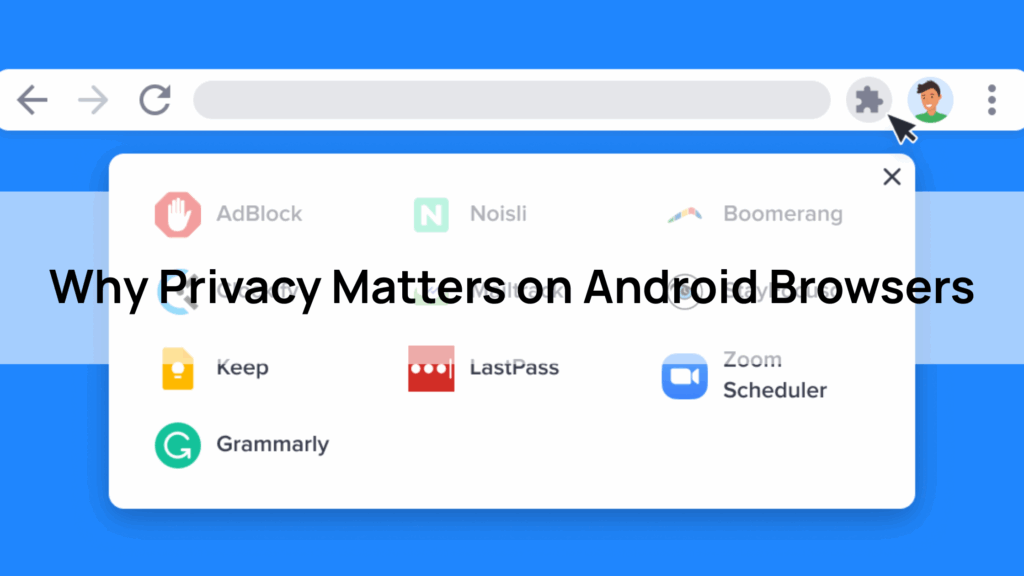In 2025, online privacy is crucial, making the Android browser for privacy essential for protecting user data on Android devices. With increasing tracking and data breaches, browsers with features like tracker blocking and encryption, safeguard against invasive practices. Choosing the best Android browser for privacy empowers users to control their digital footprint and browse securely.
Why Privacy Matters on Android Browsers
How Browsers Collect Data and Privacy Risks
Browsers collect data to enhance functionality and personalize ads, but this poses significant privacy invasion risks. Cookies store user preferences and login details, trackers monitor browsing behavior across sites, and IP addresses reveal location, enabling detailed user profiling by advertisers or potential misuse by hackers. On Android devices, these risks are amplified due to the open ecosystem, where unchecked data collection can lead to identity theft or unauthorized access. Choosing the suitable browser helps mitigate these threats by blocking trackers and limiting data retention, ensuring your online activities remain private and secure.

Specific Privacy Concerns on Android Devices
Android devices face unique privacy challenges, including excessive app permissions, aggressive ad tracking, and vulnerabilities when using public Wi-Fi, making it a critical tool for protection. Many apps request access to sensitive data like contacts or location, which can be shared with advertisers, while ad trackers follow users across apps and websites to build detailed profiles. Public Wi-Fi networks are particularly risky, as they expose data to interception without proper encryption. Privacy-focused browsers address these concerns by restricting app permissions, blocking ad trackers, and encrypting connections, safeguarding your data even on unsecured networks.
Benefits of Using the Best Android Browser for Privacy
Using the best Android browser for privacy offers significant advantages, including reduced tracking, enhanced security, and faster browsing. Browsers automatically block trackers and ads, minimizing data collection by websites and advertisers, which enhances user privacy. They also employ robust encryption and anti-fingerprinting techniques to protect against hacking attempts, particularly on vulnerable networks. By eliminating ad-heavy content, these browsers reduce page load times, providing a smoother and more efficient browsing experience. Adopting the browser empowers users to take control of their digital footprint, ensuring a safer and more streamlined online experience.
Criteria for Choosing the Best Android Browser for Privacy
Privacy Features of the Best Android Browser for Privacy
When selecting the browser, robust privacy features are paramount to protect user data from invasive tracking and potential breaches. Leading browsers offer built-in ad and tracker blockers that prevent websites and advertisers from collecting data through cookies or fingerprinting techniques. Private browsing modes, ensure no search history or cookies are stored, enhancing anonymity. Encrypted connections, like HTTPS Everywhere in Firefox, secure data transmission, especially on public Wi-Fi. These features make essential for safeguarding your online activities against unwanted surveillance and data collection.
Performance of the Best Android Browser for Privacy
The best Android browser for privacy must balance strong privacy protections with high performance, including speed, low resource usage, and compatibility across Android devices. Browsers block resource-heavy ads and trackers, resulting in faster page load times and reduced battery consumption compared to mainstream browsers. Firefox offers efficient resource management with customizable add-ons, ensuring smooth performance even on older Android devices. Compatibility is also key, as these browsers are optimized for various Android versions, from budget phones to high-end tablets.

User Experience in the Best Android Browser for Privacy
A seamless user experience is a critical factor when choosing the best Android browser for privacy, combining ease of use, customization, and cross-platform syncing for a tailored browsing experience. Browsers like Firefox provide intuitive interfaces with customizable toolbars and themes, making navigation straightforward for all users. Brave offers a clean, ad-free interface with options to adjust privacy settings easily. Cross-platform syncing allows users to synchronize bookmarks, passwords, and settings across Android devices and desktops. By prioritizing user-friendly design and flexibility, the best Android browser for privacy delivers a convenient and personalized experience while maintaining robust data protection.
Open-Source Status and Transparency in the Best Android Browser for Privacy
Open-source status and transparency are vital for the best Android browser for privacy, as they ensure trust through audited code and clear privacy policies. Browsers like Firefox and Brave are open-source, allowing independent developers to review their code for vulnerabilities or hidden tracking, fostering accountability. Tor Browser, built on open-source principles, provides maximum anonymity with transparent operations. These browsers also publish clear privacy policies detailing minimal data collection and no sharing with third parties, unlike some proprietary browsers. By choosing the best Android browser for privacy with open-source credentials, users can trust that their data is handled securely and transparently, reducing privacy risks.
Top 5 Picks for the Best Android Browser for Privacy
Brave Browser
Key Features of Brave
Brave stands out as the best Android browser for privacy due to its robust features designed to protect user data while delivering a seamless browsing experience. It offers automatic ads and tracker blocking through its Shields feature, which prevents invasive scripts and cookies from collecting user information, ensuring minimal data exposure. Brave also enforces HTTPS Everywhere, automatically upgrading connections to secure, encrypted protocols to safeguard against threats on public Wi-Fi. Additionally, its fast performance is driven by blocking resource-heavy ads, resulting in quicker page loads and lower battery usage. These features make Brave a top choice for users prioritizing privacy without sacrificing speed.
Pros & Cons of Brave
| Pros | Cons |
| Built-in Crypto Wallet: Securely manages cryptocurrencies within the browser, ideal for privacy-conscious blockchain users. | Limited Extension Support: Smaller extension library compared to Chrome, restricting users needing specific add-ons for productivity or customization. |
| Unique Rewards Program: Earns Basic Attention Tokens (BAT) for viewing privacy-respecting ads, supporting content creators or redeeming rewards without compromising data. | |
| Enhanced Privacy and Performance: Complements practices like clearing YouTube search history, offering a balance of privacy and functionality. |
Best for Specific Users
Brave is the best Android browser for privacy for users seeking a balance of robust privacy protections and high-speed performances. Its automatic ad and tracker blocking, combined with fast page loading, makes it ideal for those who want a streamlined browsing experience without intrusive ads or data collection. The browser’s crypto wallet and rewards program particularly appeal to tech-savvy users interested in cryptocurrency or those who value privacy-respecting monetization models. Whether you’re learning or aiming to minimize your digital footprint, Brave is perfectly suited for privacy-conscious Android users who prioritize speed and security.
Firefox Browser
Key Features of Firefox
Firefox is widely regarded as the best Android browser for privacy due to its robust privacy features, including Enhanced Tracking Protection, which blocks third-party trackers, cookies, and fingerprinting attempts by default, ensuring minimal data collection. As an open-source browser, its code is publicly audited, providing transparency and trust for privacy-conscious users. Additionally, Firefox offers an extensive library of add-ons, such as uBlock Origin or Privacy Badger, allowing users to further customize their privacy and security settings. These features make Firefox a top contender for those seeking a secure and flexible browsing experience on Android devices.
Pros & Cons of Firefox
| Pros | Cons |
| Highly Customizable Privacy: Enhanced Tracking Protection allows blocking specific trackers and adjusting cookie settings for tailored data privacy. | Higher Resource Usage: Consumes more battery and memory than Brave, potentially slowing performance on older or low-end Android devices. |
| Seamless Cross-Platform Syncing: Synchronizes bookmarks, passwords, and settings across devices for a consistent experience. | |
| Robust Privacy Strategy: Complements practices like clearing YouTube search history, ideal for users prioritizing flexibility and security. |
Best for Specific Users
Firefox is the best Android browser for privacy for users who value open-source software and flexibility in their browsing experience. Its transparent, audited code appeals to those who prioritize trust and accountability in their tools, while its extensive add-on ecosystem allows for tailored privacy and functionality enhancements. This makes Firefox ideal for tech-savvy users or those who frequently customize their browsing environment. Whether you’re applying or seeking a browser that syncs seamlessly with desktop, Firefox offers a versatile, privacy-focused solution for Android users.
Tor Browser
Key Features of Tor Browser
Tor Browser stands out as the best Android browser for privacy due to its advanced anonymity features, primarily its onion routing system, which routes internet traffic through multiple encrypted layers across global servers to mask user identity and location. It blocks trackers, cookies, and fingerprinting scripts by default, ensuring minimal data collection and protection against surveillance. Available on Android via the Google Play Store or direct APK download from the Tor Project. It also integrates NoScript to disable potentially harmful scripts, making it a powerful tool for users seeking to safeguard their online activities from prying eyes.
Pros & Cons of Tor Browser
| Pros | Cons |
| Unparalleled Anonymity: Onion routing ensures websites and ISPs cannot trace IP addresses or browsing habits. | Slower Speeds: Multi-layer encryption via onion routing increases page load times, less suitable for casual browsing or streaming. |
| Ideal for Sensitive Tasks: Perfect for accessing restricted content or protecting against surveillance, valuable for journalists and activists. | |
| Robust Privacy Solution: Paired with actions like clearing YouTube search history, it maintains a private digital presence on Android. |
Best for Specific Users
Tor Browser is the best Android browser for privacy for users who need near-complete anonymity, such as journalists, activists, or individuals in regions with heavy internet censorship. Its onion routing and default tracker blocking make it ideal for sensitive tasks where avoiding surveillance or data tracking is critical. While slower speeds may limit its use for everyday browsing, Tor excels for those prioritizing security over convenience. For users, Tor Browser enhances their ability to maintain a low digital profile, ensuring maximum privacy on Android devices in.
Herond Browser
Key Features of Herond Browser
Herond Browser stands out as the best Android browser for privacy with its advanced privacy and security features, including the Herond Shield for blocking ads and trackers, SSL certificate integration for secure connections, and the upcoming Tor feature for enhanced anonymity. Its Advanced Security Alert System (ASAS) proactively detects and mitigates potential threats, ensuring a safe browsing environment. Additionally, Herond offers lightning-fast performance, with page load times up to three times faster than standard browsers, alongside an integrated ecosystem featuring Herond Wallet for secure digital asset management. Herond ID is for decentralized identity control, making it a comprehensive privacy-focused solution for Android users.
Pros & Cons of Herond Browser
| Pros | Cons |
| Robust Privacy Protection: Herond Shield blocks ads and trackers, safeguarding personal data and complementing actions like clearing YouTube search history. | Unclear Resource Usage: Potential performance impact on low-end Android devices. |
| Built-in Herond Wallet: Securely manages cryptocurrencies, ideal for users in digital finance. | |
| Herond ID: Decentralized identity management enhances user control over personal data. |
Best for Specific Users
Herond Browser is the best Android browser for privacy for users who value a balance of cutting-edge privacy, high-speed performance, and an integrated digital ecosystem. It’s ideal for tech-savvy individuals, particularly those involved in cryptocurrency or decentralized technologies
DuckDuck Go
Key Features of DuckDuckGo
DuckDuckGo stands out as a privacy-first browser and search engine, offering robust features to protect user data on Android devices. Its core strength lies in its no-tracking search engine, ensuring anonymous searches free from personalized ads. The browser includes built-in tracker blocking, displaying a Privacy Grade (A-F) for each website based on detected tracking attempts. Also, its App Tracking Protection feature extends this protection to block third-party trackers in other apps.
Pros and Cons of DuckDuck Go
| Pros | Cons |
| No Tracking Search: Does not store search queries, IP addresses, or browsing history, ensuring anonymous searches without personalized ads. | No Browser Extensions: Lacks support for add-ons, limiting customization compared to Firefox or Chrome. |
| Fire Button: One-tap clearing of tabs, cookies, and browsing data, with “fireproof” options for trusted sites, ideal for quick privacy resets. | Limited Service Integration: Lacks deep integration with services like Google Maps or YouTube, reducing functionality for users reliant on these ecosystems. |
| Smarter Encryption and Cookie Management: Forces HTTPS connections and auto-handles cookie pop-ups to opt out of non-essential cookies, enhancing security and convenience. |
Best for Specific Users
DuckDuckGo is ideal for privacy-conscious Android users who prioritize anonymity and minimal data collection over personalized search results or extensive customization. It’s particularly suited for those seeking to avoid targeted ads, making it perfect for users frustrated by trackers following them.
How to Set Up and Optimize Your Privacy Browser
Step-by-Step Guide to Installing and Configuring the Best Android Browser for Privacy
Installing and configuring the best Android browser for privacy is straightforward and significantly enhances your online security.
Tips for Maximizing Privacy with the Best Android Browser for Privacy
Maximizing privacy with the browser involves proactive steps like disabling JavaScript when possible and clearing the cache regularly. JavaScript, while essential for many websites, can be exploited for tracking; in Brave, toggle “Block Scripts” in Shields’ Advanced Controls, or in Firefox, use add-ons like NoScript (via about:config adjustments) to disable it selectively, enabling it only for trusted sites. Regularly clearing the cache prevents stored data from being used to track you – set Brave to “Clear data on exit” in Settings -> Brave Shields & Privacy, or in Firefox, go to Settings -> Privacy & Security -> Clear Browsing Data and select “Cache” for periodic deletion. These practices, combined with the robust features of Brave or Firefox, ensure to keep your online activity secure and private.

Combining with Other Tools for Enhanced Privacy
Pairing the best Android browser for privacy with tools like VPNs or secure DNS services significantly boosts your online security. Proton VPN encrypts your internet traffic and masks your IP address, preventing ISPs or websites from tracking your location; download it from the Play Store, sign up (free or paid plans), and connect to a server before browsing with Brave or Firefox. Alternatively, configure Cloudflare’s 1.1.1.1 DNS by going to Android Settings -> Wi-Fi -> Modify Network -> Advanced -> DNS, and entering 1.1.1.1 to encrypt DNS queries. In Firefox, enable DNS-over-HTTPS (DoH) under Settings -> Privacy & Security -> Enable secure DNS, selecting Cloudflare. These tools complement the privacy features of the browser, creating a comprehensive shield against tracking and data leaks, especially on public Wi-Fi.
Additional Tips for Secure Browsing on Android
Regularly Update Browsers to Patch Security Vulnerabilities
Keeping the browser updated is crucial for addressing security vulnerabilities and ensuring robust protection against emerging threats. Browser updates often include patches for exploits that hackers could use to access your data or compromise your device. To update, visit the Google Play Store, search for Brave or Firefox, and tap “Update” if a new version is available, or enable auto-updates in Play Store. Alternatively, check for updates within the browser’s settings—Brave under Settings > About Brave, or Firefox under Settings > About Firefox. Regularly updating the safeguards of your browsing experience, complementing practices to maintain a secure and private online presence.
Use Strong, Unique Passwords Managed by a Password Manager
Using strong, unique passwords managed by a password manager is essential when leveraging to secure accounts linked to browsers. Weak or reused passwords can expose synced data, such as bookmarks or saved logins, to breaches. A password manager like Bitwarden or LastPass generates and stores complex passwords, ensuring each account has a unique, secure credential. Download a trusted password manager from the Google Play Store, set it up with a master password, and integrate it with your browser—Firefox supports password manager extensions, while Brave has built-in password management. By securing accounts with a password manager, the best Android browser for privacy enhances your overall security, aligning with steps to protect your digital footprint.

Avoid Downloading Apps or Extensions from Unverified Sources
To maintain the integrity of the best Android browser for privacy, it’s critical to avoid downloading apps or extensions from unverified sources, which may contain malware or trackers that undermine privacy. Stick to the Google Play Store or official browser extension stores to ensure safety. Before installing, check developer credentials and user reviews for legitimacy. For instance, downloading Brave or Firefox from unofficial APKs risks installing compromised versions that could collect data.
Enable Two-Factor Authentication for Synced Browser Accounts
Enabling two-factor authentication (2FA) for accounts synced with the best Android browser for privacy, adds a vital layer of security to protect your browsing data. 2FA requires a second verification step, like a code sent to your phone or generated by an authenticator app, alongside your password. To enable 2FA, go to your Google account (for Brave sync) or Firefox account settings at accounts.firefox.com, navigate to “Security” or “Two-Step Verification,” and set up a method like Google Authenticator or SMS. This ensures that even if your password is compromised, synced data like bookmarks or history remains secure.
Conclusion
Selecting the best Android browser for privacy to safeguard your data against invasive tracking and security threats. By leveraging features like ad and tracker blocking, encrypted connections, and open-source transparency, these browsers offer robust protection while maintaining fast performance and user-friendly customization.
About Herond
Herond Browser is a cutting-edge Web 3.0 browser designed to prioritize user privacy and security. By blocking intrusive ads, harmful trackers, and profiling cookies, Herond creates a safer and faster browsing experience while minimizing data consumption.
To enhance user control over their digital presence, Herond offers two essential tools:
- Herond Shield: A robust adblocker and privacy protection suite.
- Herond Wallet: A secure, multi-chain, non-custodial social wallet.
As a pioneering Web 2.5 solution, Herond is paving the way for mass Web 3.0 adoption by providing a seamless transition for users while upholding the core principles of decentralization and user ownership.
Have any questions or suggestions? Contact us:
- On Telegram https://t.me/herond_browser
- DM our official X @HerondBrowser
- Technical support topic on https://community.herond.org








